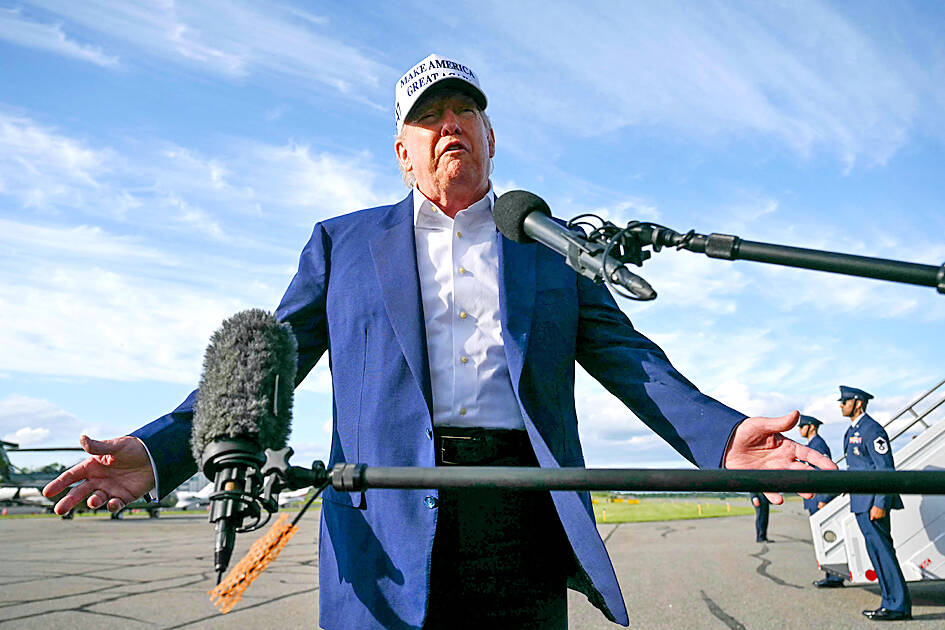US President Donald Trump on Sunday said that he would pause his threatened 50 percent tariffs on the EU until July 9, after a “very nice call” with European Commission President Ursula von der Leyen.
Trump on Friday had threatened to impose the steep duties from Saturday, voicing frustration that negotiations to avert a 20 percent “reciprocal” tariff were “going nowhere.”
However, on Sunday he agreed to postpone the tariffs until July 9 after Von der Leyen said the EU needed more time to negotiate.

Photo: AFP
Von der Leyen “just called me ... and she asked for an extension on the June 1st date and she said she wants to get down to serious negotiation,” Trump told reporters before boarding Air Force One in Morristown, New Jersey.
“And I agreed to do that,” he added.
Von der Leyen had earlier said on X that she held a “good call” with Trump, but that “to reach a good deal, we would need the time until July 9.”
“Europe is ready to advance talks swiftly and decisively,” said the head of the European Commission, which conducts trade policy for the 27-nation EU.
European stock markets — which had tumbled on Friday after Trump threatened the 50 percent tariff — yesterday rallied as investors welcomed the delay.
The Paris CAC 40 index rose 1.1 percent in morning deals, while the Frankfurt DAX was up 1.6 percent. London and Wall Street were closed for holidays.
In Asia, Taipei, Hong Kong, Shanghai, Singapore, Wellington, Manila, Bangkok and Jakarta fell, while Tokyo, Seoul and Mumbai rose. Sydney was flat.
The US dollar remained under pressure after dropping on Friday.
CMC Markets PLC analyst Jochen Stanzl said the delay was a familiar “Trump Pattern.”
“The stock market seems to dance to Trump’s tune — first a threat, then a pullback, quickly followed by a rebound as speculative investors anticipate a concession from the US president,” Stanzl said.
Brussels and Washington have been negotiating in a bid to avert an all-out transatlantic trade war and had agreed to suspend tariff action on both sides until July.
The EU is subject to a 10 percent tariff that Trump imposed last month on imports from nearly every country around the world, along with 25 percent duties on cars, steel and aluminum.
The US president originally imposed a 20 percent levy on the EU, but subsequently suspended it, giving space for negotiations.
Brussels has announced plans to impose tariffs on US goods worth nearly 100 billion euros (US$113.8 billion) if negotiations fail to produce a deal.
The US trade deficit in goods with the EU as US$236 billion last year.
However, when taking account of services where US companies are dominant, the European Commission calculates that the US trade deficit stood at US$57 billion.

SEEKING CLARITY: Washington should not adopt measures that create uncertainties for ‘existing semiconductor investments,’ TSMC said referring to its US$165 billion in the US Taiwan Semiconductor Manufacturing Co (TSMC, 台積電) told the US that any future tariffs on Taiwanese semiconductors could reduce demand for chips and derail its pledge to increase its investment in Arizona. “New import restrictions could jeopardize current US leadership in the competitive technology industry and create uncertainties for many committed semiconductor capital projects in the US, including TSMC Arizona’s significant investment plan in Phoenix,” the chipmaker wrote in a letter to the US Department of Commerce. TSMC issued the warning in response to a solicitation for comments by the department on a possible tariff on semiconductor imports by US President Donald Trump’s

‘FAILED EXPORT CONTROLS’: Jensen Huang said that Washington should maximize the speed of AI diffusion, because not doing so would give competitors an advantage Nvidia Corp cofounder and chief executive officer Jensen Huang (黃仁勳) yesterday criticized the US government’s restrictions on exports of artificial intelligence (AI) chips to China, saying that the policy was a failure and would only spur China to accelerate AI development. The export controls gave China the spirit, motivation and government support to accelerate AI development, Huang told reporters at the Computex trade show in Taipei. The competition in China is already intense, given its strong software capabilities, extensive technology ecosystems and work efficiency, he said. “All in all, the export controls were a failure. The facts would suggest it,” he said. “The US

The government has launched a three-pronged strategy to attract local and international talent, aiming to position Taiwan as a new global hub following Nvidia Corp’s announcement that it has chosen Taipei as the site of its Taiwan headquarters. Nvidia cofounder and CEO Jensen Huang (黃仁勳) on Monday last week announced during his keynote speech at the Computex trade show in Taipei that the Nvidia Constellation, the company’s planned Taiwan headquarters, would be located in the Beitou-Shilin Technology Park (北投士林科技園區) in Taipei. Huang’s decision to establish a base in Taiwan is “primarily due to Taiwan’s talent pool and its strength in the semiconductor

French President Emmanuel Macron has expressed gratitude to Hon Hai Precision Industry Co (鴻海精密) for its plan to invest approximately 250 million euros (US$278 million) in a joint venture in France focused on the semiconductor and space industries. On his official X account on Tuesday, Macron thanked Hon Hai, also known globally as Foxconn Technology Group (富士康科技集團), for its investment projects announced at Choose France, a flagship economic summit held on Monday to attract foreign investment. In the post, Macron included a GIF displaying the national flag of the Republic of China (Taiwan), as he did for other foreign investors, including China-based